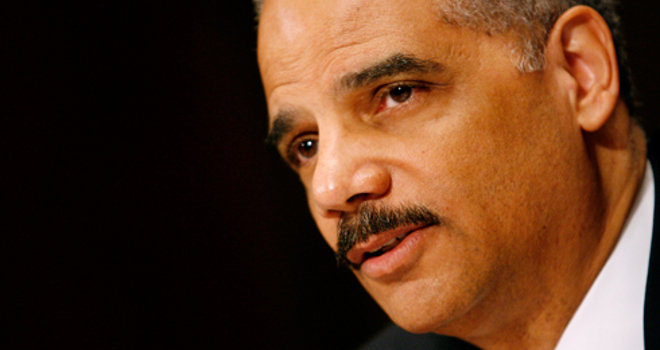Attorney General Eric Holder delivered a speech on Monday about the Obama administration’s approach to counterterrorism. He spent a significant amount of time justifying the administration’s use of targeted killing to take out al-Qaeda leaders. An excerpt from his speech:
“Furthermore, it is entirely lawful – under both United States law and applicable law of war principles – to target specific senior operational leaders of al Qaeda and associated forces. This is not a novel concept. In fact, during World War II, the United States tracked the plane flying Admiral Isoroku Yamamoto – the commander of Japanese forces in the attack on Pearl Harbor and the Battle of Midway – and shot it down specifically because he was on board. As I explained to the Senate Judiciary Committee following the operation that killed Osama bin Laden, the same rules apply today.
“Some have called such operations “assassinations.” They are not, and the use of that loaded term is misplaced. Assassinations are unlawful killings. Here, for the reasons I have given, the U.S. government’s use of lethal force in self defense against a leader of al Qaeda or an associated force who presents an imminent threat of violent attack would not be unlawful — and therefore would not violate the Executive Order banning assassination or criminal statutes.
“Now, it is an unfortunate but undeniable fact that some of the threats we face come from a small number of United States citizens who have decided to commit violent attacks against their own country from abroad. Based on generations-old legal principles and Supreme Court decisions handed down during World War II, as well as during this current conflict, it’s clear that United States citizenship alone does not make such individuals immune from being targeted. But it does mean that the government must take into account all relevant constitutional considerations with respect to United States citizens – even those who are leading efforts to kill innocent Americans. Of these, the most relevant is the Fifth Amendment’s Due Process Clause, which says that the government may not deprive a citizen of his or her life without due process of law.
“The Supreme Court has made clear that the Due Process Clause does not impose one-size-fits-all requirements, but instead mandates procedural safeguards that depend on specific circumstances. In cases arising under the Due Process Clause – including in a case involving a U.S. citizen captured in the conflict against al Qaeda – the Court has applied a balancing approach, weighing the private interest that will be affected against the interest the government is trying to protect, and the burdens the government would face in providing additional process. Where national security operations are at stake, due process takes into account the realities of combat.
“Here, the interests on both sides of the scale are extraordinarily weighty. An individual’s interest in making sure that the government does not target him erroneously could not be more significant. Yet it is imperative for the government to counter threats posed by senior operational leaders of al Qaeda, and to protect the innocent people whose lives could be lost in their attacks.
“Any decision to use lethal force against a United States citizen – even one intent on murdering Americans and who has become an operational leader of al-Qaeda in a foreign land – is among the gravest that government leaders can face. The American people can be – and deserve to be – assured that actions taken in their defense are consistent with their values and their laws. So, although I cannot discuss or confirm any particular program or operation, I believe it is important to explain these legal principles publicly.
“Let me be clear: an operation using lethal force in a foreign country, targeted against a U.S. citizen who is a senior operational leader of al Qaeda or associated forces, and who is actively engaged in planning to kill Americans, would be lawful at least in the following circumstances: First, the U.S. government has determined, after a thorough and careful review, that the individual poses an imminent threat of violent attack against the United States; second, capture is not feasible; and third, the operation would be conducted in a manner consistent with applicable law of war principles.
“The evaluation of whether an individual presents an “imminent threat” incorporates considerations of the relevant window of opportunity to act, the possible harm that missing the window would cause to civilians, and the likelihood of heading off future disastrous attacks against the United States. As we learned on 9/11, al Qaeda has demonstrated the ability to strike with little or no notice – and to cause devastating casualties. Its leaders are continually planning attacks against the United States, and they do not behave like a traditional military – wearing uniforms, carrying arms openly, or massing forces in preparation for an attack. Given these facts, the Constitution does not require the President to delay action until some theoretical end-stage of planning – when the precise time, place, and manner of an attack become clear. Such a requirement would create an unacceptably high risk that our efforts would fail, and that Americans would be killed.
“Whether the capture of a U.S. citizen terrorist is feasible is a fact-specific, and potentially time-sensitive, question. It may depend on, among other things, whether capture can be accomplished in the window of time available to prevent an attack and without undue risk to civilians or to U.S. personnel. Given the nature of how terrorists act and where they tend to hide, it may not always be feasible to capture a United States citizen terrorist who presents an imminent threat of violent attack. In that case, our government has the clear authority to defend the United States with lethal force.
“Of course, any such use of lethal force by the United States will comply with the four fundamental law of war principles governing the use of force. The principle of necessity requires that the target have definite military value. The principle of distinction requires that only lawful targets – such as combatants, civilians directly participating in hostilities, and military objectives – may be targeted intentionally. Under the principle of proportionality, the anticipated collateral damage must not be excessive in relation to the anticipated military advantage. Finally, the principle of humanity requires us to use weapons that will not inflict unnecessary suffering.
“These principles do not forbid the use of stealth or technologically advanced weapons. In fact, the use of advanced weapons may help to ensure that the best intelligence is available for planning and carrying out operations, and that the risk of civilian casualties can be minimized or avoided altogether.
“Some have argued that the President is required to get permission from a federal court before taking action against a United States citizen who is a senior operational leader of al Qaeda or associated forces. This is simply not accurate. “Due process” and “judicial process” are not one and the same, particularly when it comes to national security. The Constitution guarantees due process, not judicial process.
“The conduct and management of national security operations are core functions of the Executive Branch, as courts have recognized throughout our history. Military and civilian officials must often make real-time decisions that balance the need to act, the existence of alternative options, the possibility of collateral damage, and other judgments – all of which depend on expertise and immediate access to information that only the Executive Branch may possess in real time. The Constitution’s guarantee of due process is ironclad, and it is essential – but, as a recent court decision makes clear, it does not require judicial approval before the President may use force abroad against a senior operational leader of a foreign terrorist organization with which the United States is at war – even if that individual happens to be a U.S. citizen.
“That is not to say that the Executive Branch has – or should ever have – the ability to target any such individuals without robust oversight. Which is why, in keeping with the law and our constitutional system of checks and balances, the Executive Branch regularly informs the appropriate members of Congress about our counterterrorism activities, including the legal framework, and would of course follow the same practice where lethal force is used against United States citizens.
“Now, these circumstances are sufficient under the Constitution for the United States to use lethal force against a U.S. citizen abroad – but it is important to note that the legal requirements I have described may not apply in every situation – such as operations that take place on traditional battlefields.









